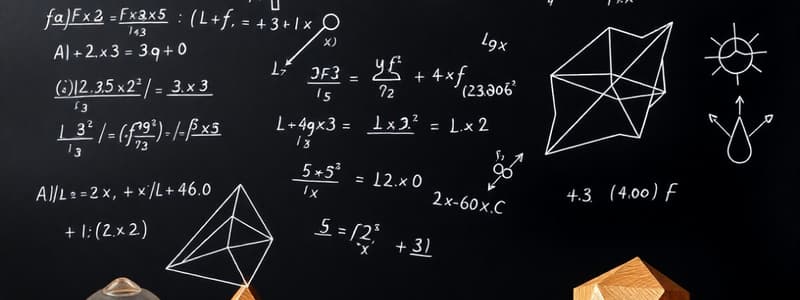Podcast
Questions and Answers
Which transformation does NOT preserve congruence in Euclidean geometry?
Which transformation does NOT preserve congruence in Euclidean geometry?
- Dilation (correct)
- Rotation
- Translation
- Reflection
What is the primary difference between an axiom and a theorem in Euclidean geometry?
What is the primary difference between an axiom and a theorem in Euclidean geometry?
- An axiom is complex, while a theorem is simple.
- An axiom is proven, while a theorem is assumed.
- An axiom is assumed, while a theorem is proven. (correct)
- An axiom is only applicable to triangles, while a theorem applies to all shapes.
Which of the following mathematical concepts is least likely to be directly applied in basic Euclidean geometry?
Which of the following mathematical concepts is least likely to be directly applied in basic Euclidean geometry?
- Variables
- Factoring Polynomials (correct)
- Solving Equations
- Inequalities
In financial modeling, what mathematical concept is most relevant for calculating the growth of an investment over time, considering accumulated interest?
In financial modeling, what mathematical concept is most relevant for calculating the growth of an investment over time, considering accumulated interest?
Which application of mathematics relies most heavily on algorithm development?
Which application of mathematics relies most heavily on algorithm development?
Which area of mathematics focuses primarily on rates of change and the determination of tangents to curves?
Which area of mathematics focuses primarily on rates of change and the determination of tangents to curves?
A mathematician is analyzing the likelihood of different outcomes in a game of chance. Which branch of mathematics is most directly applicable to this analysis?
A mathematician is analyzing the likelihood of different outcomes in a game of chance. Which branch of mathematics is most directly applicable to this analysis?
Considering the progressive expansion of number systems, which number system directly encompasses both rational and irrational numbers?
Considering the progressive expansion of number systems, which number system directly encompasses both rational and irrational numbers?
Which mathematical operation is defined as the process of finding how many times one number is contained within another?
Which mathematical operation is defined as the process of finding how many times one number is contained within another?
What is the primary focus of Geometry as a branch of mathematics?
What is the primary focus of Geometry as a branch of mathematics?
In mathematical terms, what does 'exponentiation' fundamentally represent?
In mathematical terms, what does 'exponentiation' fundamentally represent?
A computer scientist is designing an algorithm that relies on nodes and connections between them. Which area of mathematics would be most applicable to analyze this structure?
A computer scientist is designing an algorithm that relies on nodes and connections between them. Which area of mathematics would be most applicable to analyze this structure?
Which area of mathematics provides a foundation for rigorously proving mathematical statements through deductive reasoning?
Which area of mathematics provides a foundation for rigorously proving mathematical statements through deductive reasoning?
Flashcards
Mathematics
Mathematics
The study of quantity, structure, space, and change using logic and abstract reasoning.
Branches of Mathematics
Branches of Mathematics
Different key areas including arithmetic, algebra, geometry, and calculus that focus on various mathematical concepts.
Arithmetic
Arithmetic
The branch that deals with basic operations like addition, subtraction, multiplication, and division.
Algebra
Algebra
Signup and view all the flashcards
Calculus
Calculus
Signup and view all the flashcards
Statistics
Statistics
Signup and view all the flashcards
Set Theory
Set Theory
Signup and view all the flashcards
Number Systems
Number Systems
Signup and view all the flashcards
Axioms (postulates)
Axioms (postulates)
Signup and view all the flashcards
Congruence
Congruence
Signup and view all the flashcards
Transformations
Transformations
Signup and view all the flashcards
Variables
Variables
Signup and view all the flashcards
Factoring
Factoring
Signup and view all the flashcards
Study Notes
Fundamental Concepts
- Mathematics is the study of quantity, structure, space, and change.
- It uses logic and abstract reasoning to understand patterns and relationships.
- Key areas of mathematics include arithmetic, algebra, geometry, and calculus.
- Mathematics has applications in various fields, including science, engineering, and finance.
- Abstraction is a crucial aspect; mathematical objects and concepts are often idealized representations of real-world phenomena.
Branches of Mathematics
- Arithmetic: Deals with basic operations like addition, subtraction, multiplication, and division.
- Algebra: Uses symbols to represent variables and quantities, and develops methods for solving equations and inequalities.
- Geometry: Focuses on shapes, sizes, positions, and properties of figures in space.
- Calculus: Concerned with change and motion, including differential and integral calculus.
- Differential calculus: Examines rates of change and tangents to curves.
- Integral calculus: Deals with areas, volumes, and accumulation of quantities.
- Number Theory: Studies the properties of numbers, including prime numbers and other integer sequences.
- Statistics: Deals with data collection, analysis, interpretation, and presentation.
- Probability: Studies the likelihood of events occurring, often using statistical methods.
- Discrete Mathematics: Focuses on discrete structures like graphs, trees, and logic.
Basic Mathematical Operations
- Addition: Combining two or more numbers to find their sum.
- Subtraction: Finding the difference between two numbers.
- Multiplication: Repeated addition of a number.
- Division: Finding how many times one number goes into another.
- Exponentiation: Repeated multiplication of a number by itself.
- Roots: Finding a number that, when multiplied by itself a certain number of times, equals another number.
Fundamental Mathematical Systems
- Set Theory: Deals with sets of objects and their properties. Sets can be finite or infinite, and fundamental operations (union, intersection, and complement) are defined.
- Number Systems: Different sets of numbers (natural numbers, integers, rational numbers, real numbers, and complex numbers) with defined properties and operations. Each system contains the previous one, expanding progressively.
- Logic: The formal study of reasoning; often used to prove mathematical theorems in deductive systems. Includes concepts like statements, implications, and quantifiers (all, some).
Euclidean Geometry
- Basic shapes and figures: Points, lines, planes, angles, triangles, quadrilaterals, circles.
- Axioms (postulates): Fundamental assumptions about geometric properties.
- Theorems: Statements proven using axioms and definitions.
- Congruence and similarity: Properties of figures that share identical size and shape, and similar properties, respectively.
- Transformations: Rigid motions (translation, rotation, reflection) and other transformations in Euclidean geometry like dilation.
- Coordinates: Representing points in a plane or space using numerical coordinates.
Algebraic Concepts
- Variables: Symbols representing unknown or changing quantities.
- Equations: Statements showing equality between expressions.
- Inequalities: Statements showing unequal relationships.
- Polynomials: Expressions consisting of variables and coefficients.
- Factoring: Breaking down expressions into simpler expressions.
- Solving equations and inequalities: Finding solutions that satisfy the relationships defined.
Applications of Mathematics
- Science: Mathematical models describe natural phenomena.
- Engineering: Designs are based on mathematical calculations and simulations.
- Finance: Deals with mathematical concepts like compound interest to build financial models.
- Computer Science: Essential for algorithm development and software design.
Studying That Suits You
Use AI to generate personalized quizzes and flashcards to suit your learning preferences.



